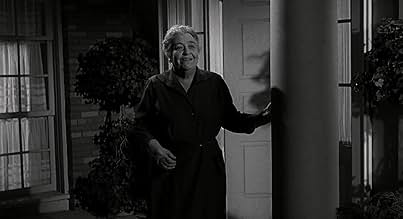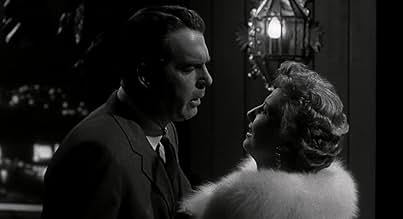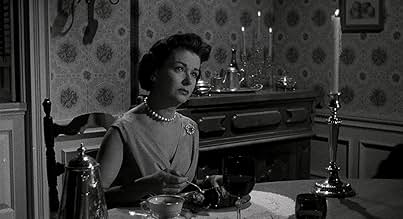IMDb RATING
7.4/10
4K
YOUR RATING
When a toy manufacturer feels ignored and unappreciated by his wife and children, he begins to rekindle a past love when a former employee comes back into his life.When a toy manufacturer feels ignored and unappreciated by his wife and children, he begins to rekindle a past love when a former employee comes back into his life.When a toy manufacturer feels ignored and unappreciated by his wife and children, he begins to rekindle a past love when a former employee comes back into his life.
- Director
- Writers
- Stars
- Director
- Writers
- All cast & crew
- Production, box office & more at IMDbPro
Featured reviews
Douglas Sirk is renowned for injecting his subversive criticism of American society of the fifties in his glossy and glamorous melodramas. What made this palatable to the public, who flocked in droves, was the fact that the families involved were showbiz families ("Imitation of Life"), filthy rich oil magnates ("Written in the Wind") or highly idealized to the point of caricature ("All that Heaven Allows", "Magnificent Obsession"), far from the average movie goers own social milieu. And of course up there on the screen were the glamorous stars, Rock Hudson, Lana Turner, Lauren Bacall, Dorothy Malone, etc. Movie fans will recall the aforementioned movies when the topic of Sirk's movies arises. It is highly unlikely that "There's Always Tomorrow" will get a mention. "There's Always Tomorrow" has barely any gloss or glamour. The social criticism is completely without disguise. The family in question is one that the vast majority of movie goers could very easily identify with. Its stars (Fred MacMurray and a not so young Barbara Stanwyk) are not glamorous. While audiences left the cinema entranced by the glorious melodrama of "Imitation of Life" and "Written on the Wind", they would have left "There's Always Tomorrow" feeling a lot less secure about their own lives, since it's a film that touches on a fair amount of "dangerous" territory, calling into question the very foundations of the American family. Douglas Sirk's sense of irony has never been sharper. The title brims with optimism and the film opens with the script, "Once Upon a Time in Sunny California". But what unfolds is a bleak, pessimistic depiction of middle class family life.
While Sirk's films have often been branded "woman's pictures", "There's Always Tomorrow" is indeed very much a man's picture. It takes a hard and deep look at the role of the male breadwinner and the picture it comes up with is not a pretty one. What we are shown is a man who when young, courted the prettiest girl, married, had children and worked hard to build up a successful business. He is now middle aged and having achieved it all, begins to feel himself taken for granted by his wife and children. His needs are completely neglected. His wife has little interest in him sexually being totally wrapped up in fulfilling the unending needs of their self centered ungrateful children. It's a scenario all too familiar to millions of men. Fred MacMurrays's Clifford Groves has become a robot similar to the one his successful toy manufacturer has created. No wonder that Norma Vale's (Stanwyk) reappearance in his life presents an opportunity to regain his lost dreams. She's an independent career woman, who sees his situation as somewhat idyllic from the outside. But with the usual intelligence of a Stanwyk character, she has no illusions as to a possible future with him. Despite the brief and obligatory conciliatory ending, Clifford Groves' future does not bode well. It should come as no surprise that the film was not well received at the box office.
"There's Always Tomorrow" has many of the hallmarks of Sirk's craftsmanship. The studio refused to grant him his request for the film to be shot in color, despite having provided Universal with some of its highest grossing pictures of the decade. At least his demand for his favorite cameraman Russell Metty was granted. Metty as always, was the perfect partner in realising Sirk's vision. His interior filming in particular is a lesson in cinematography. He had a penchant for shooting characters behind banisters, framed in mirrors and caged behind fences to enhance the sense of their being trapped. MacMurray and Stanwyk are constantly gliding through dark shadow and bright light reflecting the inherent brightness and darkness in their lives.
At this point of writing "There's Always Tomorrow" has not been released in any format and rarely gets a showing on television. It's a gross injustice to an extremely important director and a wonderfully made, moving piece of cinema.
While Sirk's films have often been branded "woman's pictures", "There's Always Tomorrow" is indeed very much a man's picture. It takes a hard and deep look at the role of the male breadwinner and the picture it comes up with is not a pretty one. What we are shown is a man who when young, courted the prettiest girl, married, had children and worked hard to build up a successful business. He is now middle aged and having achieved it all, begins to feel himself taken for granted by his wife and children. His needs are completely neglected. His wife has little interest in him sexually being totally wrapped up in fulfilling the unending needs of their self centered ungrateful children. It's a scenario all too familiar to millions of men. Fred MacMurrays's Clifford Groves has become a robot similar to the one his successful toy manufacturer has created. No wonder that Norma Vale's (Stanwyk) reappearance in his life presents an opportunity to regain his lost dreams. She's an independent career woman, who sees his situation as somewhat idyllic from the outside. But with the usual intelligence of a Stanwyk character, she has no illusions as to a possible future with him. Despite the brief and obligatory conciliatory ending, Clifford Groves' future does not bode well. It should come as no surprise that the film was not well received at the box office.
"There's Always Tomorrow" has many of the hallmarks of Sirk's craftsmanship. The studio refused to grant him his request for the film to be shot in color, despite having provided Universal with some of its highest grossing pictures of the decade. At least his demand for his favorite cameraman Russell Metty was granted. Metty as always, was the perfect partner in realising Sirk's vision. His interior filming in particular is a lesson in cinematography. He had a penchant for shooting characters behind banisters, framed in mirrors and caged behind fences to enhance the sense of their being trapped. MacMurray and Stanwyk are constantly gliding through dark shadow and bright light reflecting the inherent brightness and darkness in their lives.
At this point of writing "There's Always Tomorrow" has not been released in any format and rarely gets a showing on television. It's a gross injustice to an extremely important director and a wonderfully made, moving piece of cinema.
Pasadena toy manufacturer Fred MacMurray (as Clifford "Cliff" Groves) is wealthy and successful, but feels neglected by his busy family. His children are preoccupied with their own lives and loving wife Joan Bennett (as Marion) always finds herself committed to something other than time with Mr. MacMurray. He feels ignored, unappreciated and lonely. Enter former employee Barbara Stanwyck (as Norma Miller-Vale). Formerly plain, but now an attractive dress designer, Ms. Stanwyck arrives in Los Angeles on business. She's clearly interested in rekindling something with MacMurray...
The best part here is that "There's Always Tomorrow" has director Douglas Sirk working in the 1950s, with his best photographer Russell Metty. This means artful shadows, stairways, windows and reflections. Such visuals, especially as they complement the story, are great. There is even a scene with Stanwyck's face shedding tears that are actually reflected raindrops; a technique said to have originated with "In Cold Blood" (1967). Quite possibly, this was done even earlier...
The cast is strangely unimpassioned. MacMurray and Stanwyck lack the level of spark they conveyed in previous collaborations. Perhaps this is the point. MacMurray has become like the toy robot he created. He's "Rex" the walkie-talkie mechanical man. Stanwyck appears to be hesitating an attempted seduction. While not the protagonist, she becomes the most interesting character. Completely and most maddeningly in the dark, Ms. Bennett acts robotically unaware of the threat to her supposedly perfect family life. Shaking things up is suspicious and literate son William Reynolds (as Vinnie).
******* There's Always Tomorrow (1/20/56) Douglas Sirk ~ Fred MacMurray, Barbara Stanwyck, Joan Bennett, William Reynolds
The best part here is that "There's Always Tomorrow" has director Douglas Sirk working in the 1950s, with his best photographer Russell Metty. This means artful shadows, stairways, windows and reflections. Such visuals, especially as they complement the story, are great. There is even a scene with Stanwyck's face shedding tears that are actually reflected raindrops; a technique said to have originated with "In Cold Blood" (1967). Quite possibly, this was done even earlier...
The cast is strangely unimpassioned. MacMurray and Stanwyck lack the level of spark they conveyed in previous collaborations. Perhaps this is the point. MacMurray has become like the toy robot he created. He's "Rex" the walkie-talkie mechanical man. Stanwyck appears to be hesitating an attempted seduction. While not the protagonist, she becomes the most interesting character. Completely and most maddeningly in the dark, Ms. Bennett acts robotically unaware of the threat to her supposedly perfect family life. Shaking things up is suspicious and literate son William Reynolds (as Vinnie).
******* There's Always Tomorrow (1/20/56) Douglas Sirk ~ Fred MacMurray, Barbara Stanwyck, Joan Bennett, William Reynolds
In Southern California, Cliff (Fred MacMurray) is a successful toy manufacturer but at home, he feels neglected and taken for granted by his wife (Joan Bennett) and three children - two of whom are teenagers. Norma (Barbara Stanwyck) is a former colleague and friend who pays a visit after many years away. The two lonely souls strike a solid companionship but the film asks the question: will there be more than just friendship?
While watching this film, it's often tempting to expect a formulaic story and guess where it will go next. But, as written by Bernard Schoenfeld (based on a story by Ursula Parrott), it often goes in a different direction. When it does veer in predictable territory, it still does so with some unexpected surprises.
It helps to have the solid direction of Douglas Sirk ("All That Heaven Allows" (1955), "Written on the Wind" (1956) and "Imitation of Life" (1959)) as well as a solid cast. MacMurray is superb in a role rarely shown on screen - a neglected patriarch who feels the hurt. But Stanwyck is truly at her best (which is saying a lot) in a multi-layered role.
At the beginning, she shows true charm, class, and charisma as someone so well-mannered and entertaining, one would want to be in her presence at any gathering. As a successful fashion designer, she's almost comical in a scene of being in such demand for time at her office that she ends up snapping at everyone. In the later dramatic scenes, she shows her true power especially during a conversation with Cliff's teenage children. This performance matches what is likely her best - in "Stella Dallas" (1937).
It makes one yearn for the times in Hollywood when experienced actresses over forty got roles that showed their best. Those days may be gone for now but at least films like this are great reminders of a great era. - dbamateurcritic
OUTSTANDING ACHIEVEMENT: Acting by Barbara Stanwyck
While watching this film, it's often tempting to expect a formulaic story and guess where it will go next. But, as written by Bernard Schoenfeld (based on a story by Ursula Parrott), it often goes in a different direction. When it does veer in predictable territory, it still does so with some unexpected surprises.
It helps to have the solid direction of Douglas Sirk ("All That Heaven Allows" (1955), "Written on the Wind" (1956) and "Imitation of Life" (1959)) as well as a solid cast. MacMurray is superb in a role rarely shown on screen - a neglected patriarch who feels the hurt. But Stanwyck is truly at her best (which is saying a lot) in a multi-layered role.
At the beginning, she shows true charm, class, and charisma as someone so well-mannered and entertaining, one would want to be in her presence at any gathering. As a successful fashion designer, she's almost comical in a scene of being in such demand for time at her office that she ends up snapping at everyone. In the later dramatic scenes, she shows her true power especially during a conversation with Cliff's teenage children. This performance matches what is likely her best - in "Stella Dallas" (1937).
It makes one yearn for the times in Hollywood when experienced actresses over forty got roles that showed their best. Those days may be gone for now but at least films like this are great reminders of a great era. - dbamateurcritic
OUTSTANDING ACHIEVEMENT: Acting by Barbara Stanwyck
Coming,in Sirk's career ,just after "All that Heaven allows" ,it looks like its twin movie.Unlike "Written on the wind" or "Imitation of life" or "Magnificent obsession" ,it's not melodrama.It's closer to realistic psychological drama.More than the lingering charm of a romantic past (Blue Moon/You saw me standing alone/Without a love of my own),Sirk focuses on the selfishness of the children.Remember in "All that Heaven..." how the son and the daughter could not admit that their mother (of the upper class) should fall in love with a gardener and how they bought her a TV set where she only could see the reflection of her loneliness.Here the boy's attitude is not far from that: a spoiled child -as his sisters are- ,only concerned by his studies and his love affair,he does not care if his papa has become a nine-to-five man ,useful only for the dough he brings home,a life no more exciting than that of the toy robot he sells.Barbara Stanwyck 's role recalls the 1953 effort "all I desire" : the return of the woman,be she legitimate or a former flame.But in "there's always tomorrow",one can notice one of the permanent features of melodrama though: the woman who turns her back on love and becomes a successful businesswoman (or star) (see also the end of "written on the wind" "imitation of life" or Stahl's "only yesterday")
Stylish drama acted expertly by super professionals. The powerful duo of Stanwyck and MacMurray excel when paired together and this is a fine example of that. Sadly this film is somewhat obscure, a shame since it really does examine in simple terms the crisis a man faces when he realizes he has fallen into a rut without being aware of it. Another winner from Sirk and perhaps even better then some of his more renown films, which are certainly enjoyable if sometimes over the top and a little lurid, since this drama is muted and closer to real life. The problems the film examines seem rooted in the 50's consumerism but by looking a little deeper they are revealed to be universal and timeless issues. This was the final pairing of Barbara and Fred, all their collaborations are worth watching, although The Moonlighter is rather sketchy, but this is the only one showing them as a mature pair and it's a pity they didn't have a chance to make perhaps one more when they had reached old age since they brought out the best in each other.
Did you know
- TriviaAcclaimed documentary filmmaker Errol Morris named it as one of his 10 favorite films in the 2002 BFI Sight & Sound Poll.
- GoofsNear the end, Vinnie is telling his girlfriend that he was wrong "about Norma and Cliff" in these exact words. But Cliff is his father; he wouldn't refer to his father by his first name.
- Quotes
Norma Miller Vale: Love is a very reckless thing. Maybe it isn't even a good thing. When you're young and in love, nothing matters except your own satisfaction. The tragic thing about growing older is that you can't be quite as reckless anymore.
- ConnectionsFeatured in Perspectives sur la famille américaine (2008)
- SoundtracksBlue Moon
(uncredited)
Written by Richard Rodgers and Lorenz Hart
Played on one of the toys and heard as a theme throughout the film
- How long is There's Always Tomorrow?Powered by Alexa
Details
- Runtime
- 1h 24m(84 min)
- Color
- Aspect ratio
- 1.85 : 1
Contribute to this page
Suggest an edit or add missing content



































